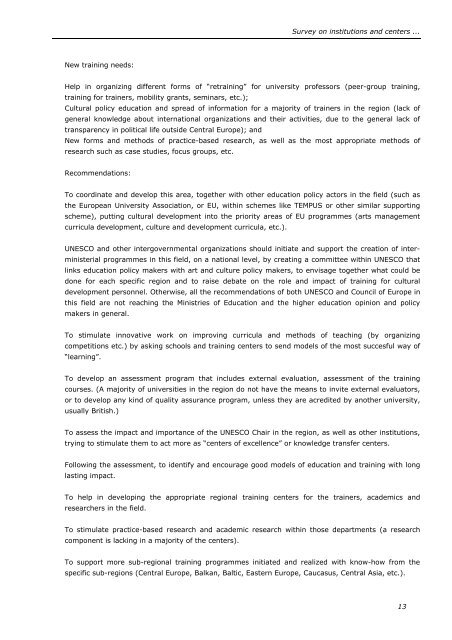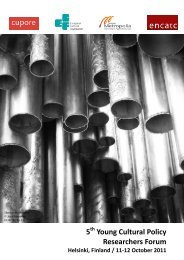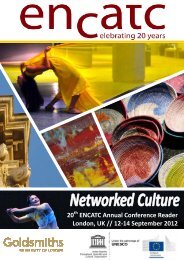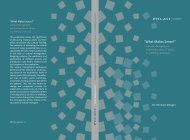Training in cultural policy and management: international ... - Encatc
Training in cultural policy and management: international ... - Encatc
Training in cultural policy and management: international ... - Encatc
You also want an ePaper? Increase the reach of your titles
YUMPU automatically turns print PDFs into web optimized ePapers that Google loves.
New tra<strong>in</strong><strong>in</strong>g needs:<br />
Survey on <strong>in</strong>stitutions <strong>and</strong> centers ...<br />
Help <strong>in</strong> organiz<strong>in</strong>g different forms of “retra<strong>in</strong><strong>in</strong>g” for university professors (peer-group tra<strong>in</strong><strong>in</strong>g,<br />
tra<strong>in</strong><strong>in</strong>g for tra<strong>in</strong>ers, mobility grants, sem<strong>in</strong>ars, etc.);<br />
Cultural <strong>policy</strong> education <strong>and</strong> spread of <strong>in</strong>formation for a majority of tra<strong>in</strong>ers <strong>in</strong> the region (lack of<br />
general knowledge about <strong>in</strong>ternational organizations <strong>and</strong> their activities, due to the general lack of<br />
transparency <strong>in</strong> political life outside Central Europe); <strong>and</strong><br />
New forms <strong>and</strong> methods of practice-based research, as well as the most appropriate methods of<br />
research such as case studies, focus groups, etc.<br />
Recommendations:<br />
To coord<strong>in</strong>ate <strong>and</strong> develop this area, together with other education <strong>policy</strong> actors <strong>in</strong> the field (such as<br />
the European University Association, or EU, with<strong>in</strong> schemes like TEMPUS or other similar support<strong>in</strong>g<br />
scheme), putt<strong>in</strong>g <strong>cultural</strong> development <strong>in</strong>to the priority areas of EU programmes (arts <strong>management</strong><br />
curricula development, culture <strong>and</strong> development curricula, etc.).<br />
UNESCO <strong>and</strong> other <strong>in</strong>tergovernmental organizations should <strong>in</strong>itiate <strong>and</strong> support the creation of <strong>in</strong>term<strong>in</strong>isterial<br />
programmes <strong>in</strong> this field, on a national level, by creat<strong>in</strong>g a committee with<strong>in</strong> UNESCO that<br />
l<strong>in</strong>ks education <strong>policy</strong> makers with art <strong>and</strong> culture <strong>policy</strong> makers, to envisage together what could be<br />
done for each specific region <strong>and</strong> to raise debate on the role <strong>and</strong> impact of tra<strong>in</strong><strong>in</strong>g for <strong>cultural</strong><br />
development personnel. Otherwise, all the recommendations of both UNESCO <strong>and</strong> Council of Europe <strong>in</strong><br />
this field are not reach<strong>in</strong>g the M<strong>in</strong>istries of Education <strong>and</strong> the higher education op<strong>in</strong>ion <strong>and</strong> <strong>policy</strong><br />
makers <strong>in</strong> general.<br />
To stimulate <strong>in</strong>novative work on improv<strong>in</strong>g curricula <strong>and</strong> methods of teach<strong>in</strong>g (by organiz<strong>in</strong>g<br />
competitions etc.) by ask<strong>in</strong>g schools <strong>and</strong> tra<strong>in</strong><strong>in</strong>g centers to send models of the most succesful way of<br />
“learn<strong>in</strong>g”.<br />
To develop an assessment program that <strong>in</strong>cludes external evaluation, assessment of the tra<strong>in</strong><strong>in</strong>g<br />
courses. (A majority of universities <strong>in</strong> the region do not have the means to <strong>in</strong>vite external evaluators,<br />
or to develop any k<strong>in</strong>d of quality assurance program, unless they are acredited by another university,<br />
usually British.)<br />
To assess the impact <strong>and</strong> importance of the UNESCO Chair <strong>in</strong> the region, as well as other <strong>in</strong>stitutions,<br />
try<strong>in</strong>g to stimulate them to act more as “centers of excellence” or knowledge transfer centers.<br />
Follow<strong>in</strong>g the assessment, to identify <strong>and</strong> encourage good models of education <strong>and</strong> tra<strong>in</strong><strong>in</strong>g with long<br />
last<strong>in</strong>g impact.<br />
To help <strong>in</strong> develop<strong>in</strong>g the appropriate regional tra<strong>in</strong><strong>in</strong>g centers for the tra<strong>in</strong>ers, academics <strong>and</strong><br />
researchers <strong>in</strong> the field.<br />
To stimulate practice-based research <strong>and</strong> academic research with<strong>in</strong> those departments (a research<br />
component is lack<strong>in</strong>g <strong>in</strong> a majority of the centers).<br />
To support more sub-regional tra<strong>in</strong><strong>in</strong>g programmes <strong>in</strong>itiated <strong>and</strong> realized with know-how from the<br />
specific sub-regions (Central Europe, Balkan, Baltic, Eastern Europe, Caucasus, Central Asia, etc.).<br />
13






